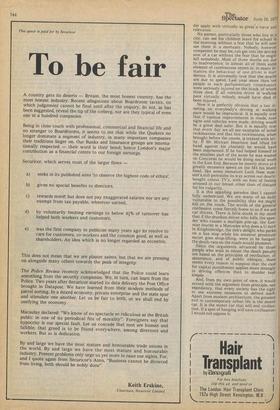Death on the road
John Vaizey
The recurrent and by now tedious discussion on capital punishment deals almost exclusively with its effects, moral and practical, on murder. As a matter of fact murder is a rare crime—about one a day—and most murders are committed by enraged husbands, embittered daughters and other people who are temporarily or permanently out of their minds. From anybody's actual likelihood of being murdered, it is not all that noteworthy a crime. But there is a range of crimes of far greater significance and which affect everybody almost every day where the death penalty would be an immediate deterrent and where the arguments used in the case of mur der apply with virtually as great a force and relevance.
No parent, particularly those who live in a city, can see his children leave for school in the morning without a fear that he will next see them in a mortuary. Nobody, however competent he may be, can get into the driving seat of a car without the fear that he might kill somebody. Most of those deaths are due to inadvertence; in almost all of them some
element of carelessness enters in; in many instances the behaviour of one driver is murderous. It is universally true that the deaths are due to speed. Last year more than ten people in each parliamentary constituencY were seriously injured on the roads, of whom
three died. If all vehicles drove at walking pace virtually nobody would have died or been injured.
Now it is perfectly obvious that a law insisting on everybody's driving at walking pace would be impractical. It is equally true that if various improvements in roads, road signs and vehicles were made, driving would be a great deal safer. But it is equally true that every day we all see examples of lethal recklessness and that this recklessness, when brought before the courts, is treated with levity. If Mr Michael Heseltine had lifted his hand against his charlady he would have been imprisoned. If he had helped himself to the smallest part of the sums he was wasted on Concorde he would be doing social work in the East End. Because he merely drove at a greatly excessive speed on the M4 his blond head, like some immature Loch Ness monster's,still peroxides its way across our dearly bought colour TV's, with no hint of feeling aroused in our breast other than of distaste for his vulgarity.
It is this appalling paradox that I cannot fully understand. We are many of us daily vulnerable to the possibility that we might kill on the roads. The words of the general confession come fiercely home to us if we are car drivers. There is little doubt in my mind that if the drunken driver who kills, the speeder who causes a multiple pile-up, the German tourist in a Mercedes who does a U-turn in Knightsbridge, the deb's delight who parks on a bus stop while his amateur prostitute escort goes shop-lifting, were to be hanged, the death-rate on the roads would plummet. Since the arguments advanced by those people who wish to retain the death penaltY are based on the principles of retribution, of deterrence, and of public obloquy, there seems every reason to suppose that the case
for capital punishment applies more strongly to driving offences than to murder tout simple.
And, from my own point of view, it would accord with the argument from principle, not expediency, that every society has the right to use extreme measures to defend itself. Apart from modern architecture, the greatest evil in contemporary urban life is the .motor car. It is the motor car that will end civilisation. If a spot of hanging will save civilisation. I would not oppose it.



































 Previous page
Previous page